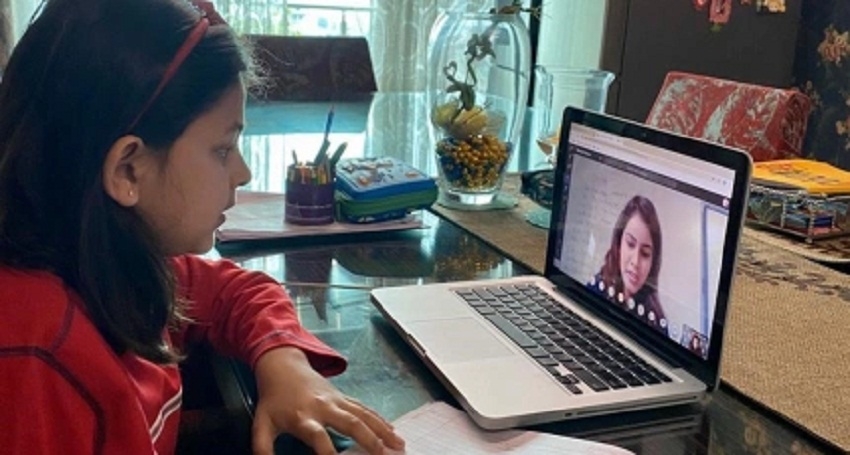‘On-line education is fine, but what about social development of kids?’
11 Apr 2021 02:28:37

By Kartik Lokhande :
Thanks to COVID-19 pandemic, subsequent lockdown, restrictions on physical conduct of classes in schools, children have spent most of the closing academic session in homes. Online education, which was initially welcomed as a ‘change’, is now being viewed by many including the parents as no alternative to physical conduct of classes. For, children do not go to schools only to study but to meet, argue, agree, disagree, and play with friends. Also, online education and over-exposure to gadgets and virtual world is slowly affecting their emotional growth, social development, and level of patience.
Their disinterested and unexcited approach towards things in life, and lack of usual sweet and chirpy behaviour are becoming cause of concern for parents. This came to fore when ‘The Hitavada’ spoke to some of the parents. Vinod Soitkar, a Government officer, is father of two sons Jaineel and Riyan. According to him, online education is fine but the teacher-student interaction is not to the desired level. For, students are unable to get their doubts cleared during online classes. He rues that because of prevailing situation, there is no social interaction or informal group discussion among students, and no friend-to-friend communication on topics of common interest. “Children cannot discuss everything with parents. They need someone of their age to chat with,” feels Soitkar. Sharing of emotional experiences is less these days. Children have got no vent. As a result, they get irritated. Lack of physical activity because of restrictions on outdoor movement is locking up their energy. Chatting with cousins over video-calls is one way of sharing their emotions with each other.
“Children prefer video-calls as they feel that talking to someone face-to-face is some kind of solace,” he adds. But, for the situation to return to normalcy, he says, sadly, there is no other option but to wait till COVID-19 is over. Naina Singhis mother of two girls Navya and Jayanti, and is a home-maker. She agrees that despite online classes, social interaction of children stands badly affected. “Online classes are okay but interaction with friends, lunch-time chats, habit of rising early, donning the school uniform, and excitement of going to school... these are not there,” she laments. In online classes, students are getting more exposed to technology and attendance is 100 per cent, but what about learning, she wonders. Only objective questions, and no long answers, are asked in tests. So, there is no evolution of thinking. Besides, she points out possibility of students cheating in online tests by keeping video off. “Students are unable to derive the joy out of co-learning in the present situation.
No new friends are being added to their life, there is no excitement. My daughter says that she does not feel like drawing as according to her, life is sort of colourless due to COVID-19,” explains Singh. In case of physical conduct of school, it was everyday routine for her to tell me about good or bad experiences she gained durig the day. “In the closing academic year, she got to go to school only for four days. Those four days were kind of welcome break for her, the happiness in her voice was back,” she adds. Due to no social interaction, no physical exercise, mental and physical growth of children are getting affected, says Seema Sahu, a home-maker and mother of one girl child Divyanka. “There is no learning of life skills through self-experience, no emotional experiences. Children are getting classroom knowledge but interaction with friends is sorely missing. In normal circumstances, they have to deal with friends, teachers, elders, and even different situations.
This makes them shape their responses. However, now, they are unable to evolve due to COVID-19 confinement,” she rues. Referring to her friend’s family, Sahu observes that children are busy playing games and even brilliant students are losing interest in studies. He friend’s son is brilliant in Mathematics, but is glued to some game on mobile phone. “Worrying trend,” she says. Particularly the parents in nuclear families are busy and are unable to monitor their children at home round-the-clock. “Online education has its advantages, but speaking of personality development, disadvantages are more. However, given the situation, what else can we do but wait for normal days to return?” asks Sahu. Parag Gokhale is a business person, and father of two children Gaurang and Narayani. He, too, feels that COVID-19 situation and online education have impacted the children. In the current situation, physical activities and social sharing are not there.
As a result, obesity and irritability are on the rise. Besides, children are becoming more reactive than responsive. Patience to listen to elders has reduced. They are sticking to gadgets. They are focussing more on presentability than personality. They are unable to find on their own the ways to invest their energy, he says. According to Gokhale, children are gaining some creative ideas from mobile phones, TV etc, but they are harbouring emotional vacuum deep within. Soft skills development through experience with real people, real situations, real world is missing. “They are feeling vacuum of not being able to share with friends. If siblings are there, they may still interact with each other. But, in nuclear families, problem assumes greater proportion,” he points out.